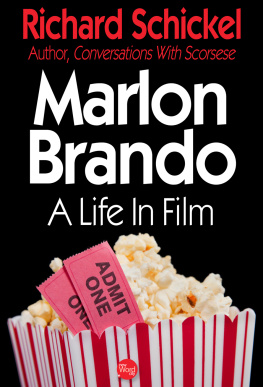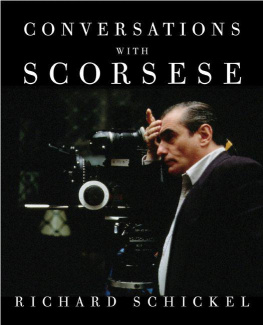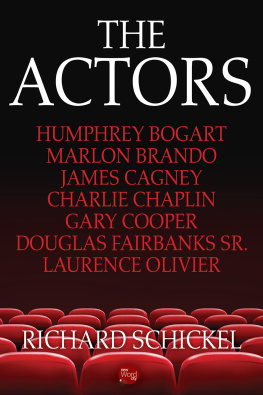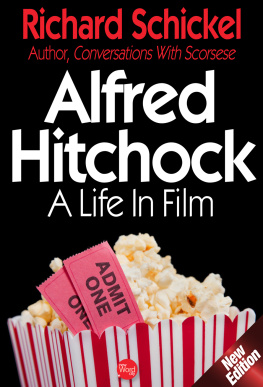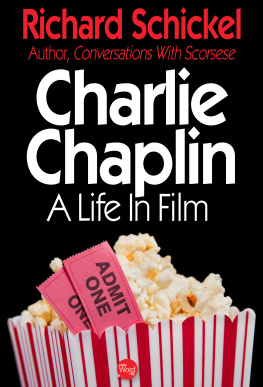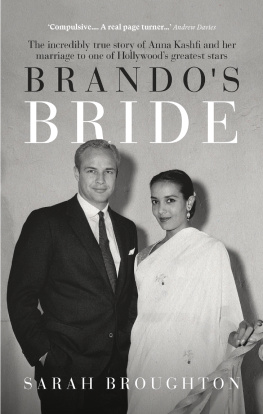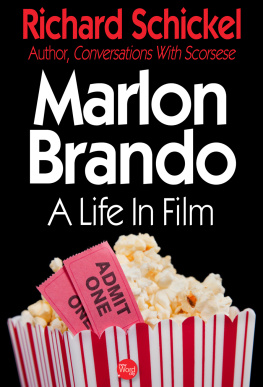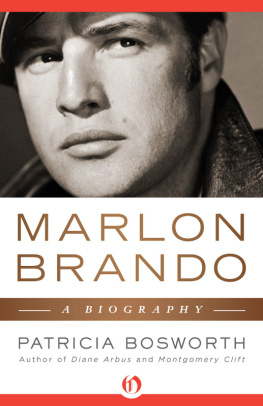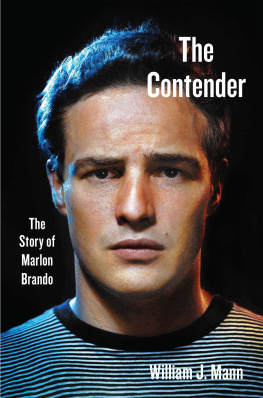MARLON BRANDO, A LIFE IN FILM
We began worrying about Marlon Brando almost immediately - not a half dozen years after he went to Hollywood and made his first movie. His great run of films - great at least in the sense that they permitted him to impress himself indelibly on a generations consciousness - was perhaps the most exciting thing about the movies in the first years of the fifties. From The Men in 1950 through the film version of his stage masterpiece, A Streetcar Named Desire, to his one public brush with Shakespeare in Julius Caesar, to his disparate rebels in Viva Zapata! and The Wild One (one with a cause, the other without), and on to the Oscar-winning culmination of this first phase, On the Waterfront, he had laid out his credentials, and by 1954 they had finally been accepted by nearly everyone (witness the Academy Award) as genuine. Moreover, he had done it his way. He had worn his blue jeans in Bel Air (long before it became fashionable; indeed, he probably established the fashion); he had insulted Louella Parsons; he had picked his nose in public and said terrible things about mighty people. He was, the star as anti-star. But now, as the Chianti went round in the lofts and railroad flats of lower Manhattan, the discussions of Marlon - emotionally everyone was on a first-name basis with him - grew hot with anxiety, cool with gloom. Why was he staying so long on the Far Coast? When would he return home to his roots, enter again upon that temple of truth the theater? Was it possible - darkest of all possibilities - that he, of all people, was now in danger of selling out? Was it possible, perhaps, that the deal had already been struck?
Something quite astonishing, quite without historical antecedents in our culture, was going on here. Some three decades earlier D.W. Griffith, the man who had pioneered (with limited success) the radical notion that a moviemaker might be taken seriously as an artist, cast his eye wistfully over the history of American heroism, noting that in his time the military leader had been replaced as the repository of our highest admiration by the inventor and the entrepreneur. Now, in the 1920s, he wondered if sometime in the not too distant future the artist might, in his turn, replace these figures as the one who expresses in the highest degree the achievement the people of the nation would like to achieve individually. At last, in postwar America, the moment he, among others, had dreamed of was at hand. For the first time the mass media, the mass public indeed began to see certain figures in all the arts in a heroic light. We had now the time, the money, and the communications technology to attend, on a more intimate basis than ever before, the great drama of creation; we could now share immediately in the thrill of the artists victories over his own demons and the indifference of the crass world, to suffer with him the agonies of his defeats. It was Brandos fortune (and misfortune) to be the new young actor, representing what seemed to be a radically new approach to his art, on which this unprecedented attention was focused.
He thus became the first actor to be burdened not just with the weight of conducting a significant and interesting career but with what seemed to be an obligation to transcending our customary expectations of the performer. His selections of roles, his actions offstage - these had symbolic implications, cultural consequences in the eyes of many of his beholders. Nor was that the end of his responsibilities as others defined them. He had, it seemed, a duty to the past - to redeem certain promises an older generation of theatrical idealists had made to themselves - and to the future - to lead what amounted to a revolution of rising expectations, passionately believed in by a younger crowd of idealists.
These were huge responsibilities. Moreover, they were responsibilities he had not sought. Brando, I now think, instinctively recognized what was going on. And just as instinctively he recognized that he was wrong for the part in which people, most of them strangers, some of them users, were trying to cast him. That was the source of the enigmatic behavior that was so worrisome to people at this early stage of his career. But his instincts were right. His best interviews through the years reveal a man with a wild sense of the worlds pompous absurdities, a nice self-deprecating sense of humor, a desperate fear of seeming to take himself too seriously - or of allowing anyone else to do so - and an authentic desire for privacy that went far beyond the usual star protestations on that subject. If he was a great observer of people (by all reports, he was an acute, hilarious, quick-study mimic of anyone who crossed his path), he was no intellectual, so he was never comfortable generalizing and pronouncing on big topics. And he was certainly not a born leader of any cause or movement. If anything, he was a natural anarchist. He kept telling Truman Capote, who profiled him for the New Yorker in 1957, not to believe more than 40 percent of what he said. He also said that his attention span was never longer than seven minutes. One can see in retrospect that he was trying to warn people that the role of drum major in an aesthetic revolution was not within his neutral range.
Those of us who participated in the concern over him and his future course, young show folk and hangers-on like me, who had come to New York in part because the theater still had some vital connection with our lives thirty-odd years ago, did not realize how unprecedented our anxiety was. We were aware that our interest in Brando was of quite a different, more passionate order than the hushed respect we accorded the great knighted English actors then regularly visiting us, quite different, too, from the uncomplicated affection for certain movie stars that we had carried over from childhood. Certainly we understood that there was something generational in our regard for him, some sense that he spoke for those of us coming of age in the postwar years - or was trying to in his inarticulate way - and against many of the bourgeois assumptions and expectations about theatrical performance that older people frequently expressed to us when we squabbled with them about his work.
But we were truly unaware of the full burden that we were participating in pressing down upon him. Made conscious by the liberal and intellectual press that the 1950s were, in general, a period of extraordinary political, social, and artistic blandness, we were yet unaware that ironically, both the theater and the movies had reached a point where they required - or seemed to some people prominent within those fields to require - a symbolic figure around which a revolution or, at any rate, a long-dreamed-of reformation could coalesce. Certainly we were unaware that our youthful and quite innocent enthusiasm for the force and singularity of Brandos work was the source of that star power the reformers believed might be harnessed to their own reconstructive enterprises.
But if the reformers had misjudged this man, they had not misjudged this moment. If ever the time was right for basic changes in the way show business did business, this was it. Indeed, reforms of a sort were already beginning to occur. For it seemed that the corrupt old institutions of show business - vulgar, commercial Hollywood; vulgar, commercial Broadway - could not long endure in their present states. Hollywoods faltering condition was widely reported in the press of the time and remains widely known to readers of its history. The start of television networking in 1948 quickly undermined the movies prosperity. In a few years the weekly audience for films had shrunk by two thirds. At the same time a consent decree in a long-fought antitrust suit forced the studios to divest themselves of their profitable, stabilizing theater chains. With no need to fulfill their former obligation to supply a weekly change of program to their theaters, and with hard times reducing their numbers, the need for a large number of productions and large numbers of stars to appear in them declined. The long-term contract binding stars to studios disappeared with the need for their regular services. As for Broadway, for a long time the only live theater that counted in this country, the source of new playwrights, new actors, and the font from which what was left of the theatrical road emanated, it seemed to shrink a little every year - fewer theaters, fewer new shows opening, fewer profitable long runs.

